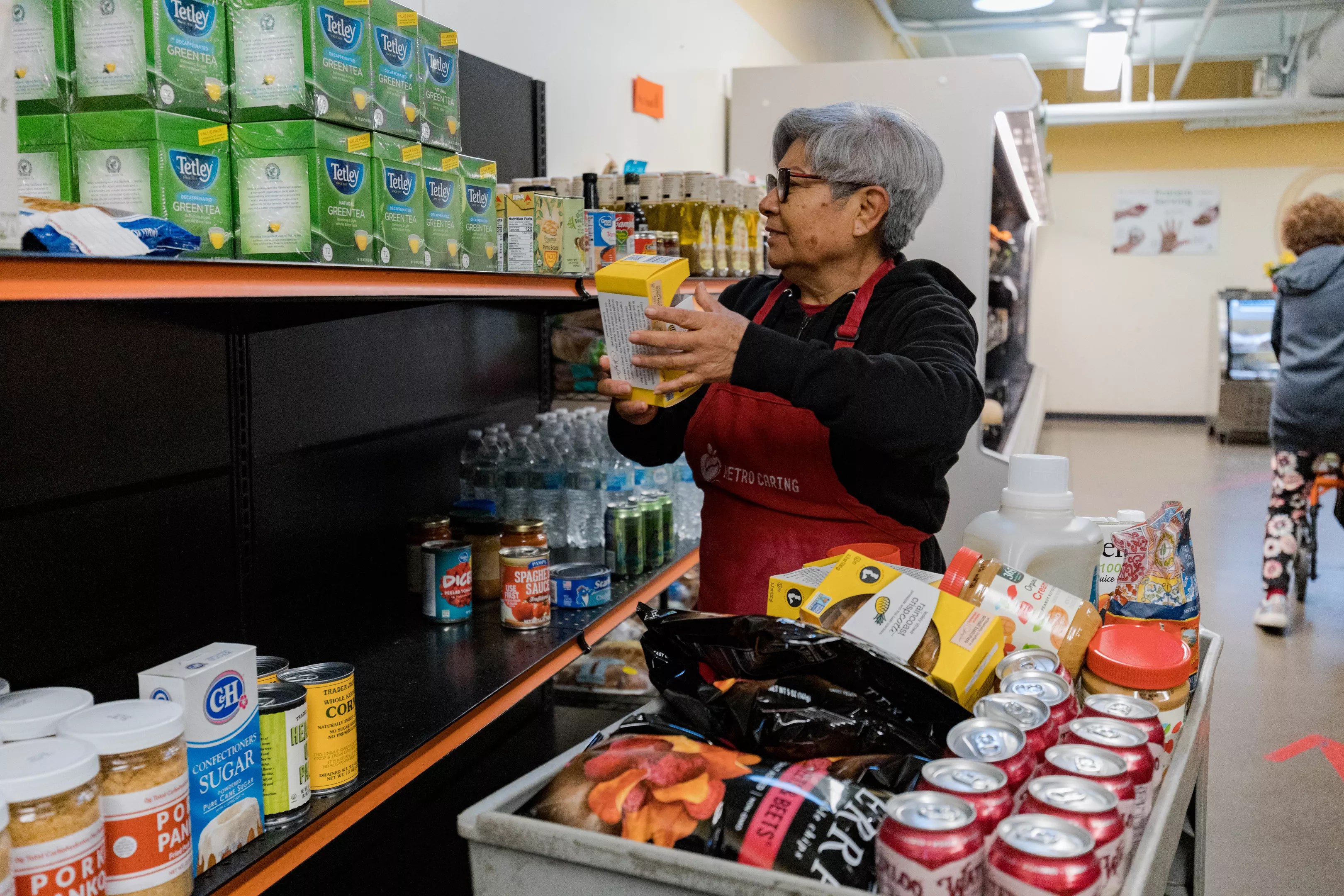
Saucedo Media

Audio By Carbonatix
Anniversaries are often cause for celebration, but hunger-relief nonprofit Metro Caring is meeting a big milestone with mixed feelings. The organization was established in Denver fifty years ago, when five churches pooled their resources and started one of the first food banks in the country. While Metro Caring has long served the community’s immediate needs, CEO Teva Sienicki admits that it’s proven ineffective in addressing the root of the problem.
“What we’ve learned is that the charitable food model is not solving hunger. We’ve been growing as an organization for fifty years and not making a dent in hunger. We now have multiple generations returning to our market,” she says.
Located at 1100 East 18th Avenue, Metro Caring’s no-cost market sees around a thousand weekly visitors. With community feedback, it’s improved its services in recent years, doing away with pre-packed boxes. Instead, individuals can access its grocery store-like aisles by appointment, without being required to prove need.
Metro Caring is one of several nonprofits that accept food donations, but many products are purchased by the organization to ensure freshness and cultural relevance. For example, Eva Valdez supplies the market with fresh tortillas through her company The Tortilla Project, which Metro Caring helped her start.
Sienicki notes that 94 percent of the dollars spent on its market supports local farmers and producers, predominantly those who are part of marginalized groups. “It’s so important because we hear from farmers that they themselves are experiencing food insecurity,” she explains.
But as the organization has learned through the decades, the food bank has a limited impact on its mission to end hunger. As a result, Metro Caring has adopted a two-pronged approach: “We try to provide food for all and hunger for none,” says Sienicki.
The latter part of that pledge gets to the core of the issue through holistic programming, including policy work, a “universal basic food” pilot program and educational classes on health, cooking and urban agriculture.
As Sienicki emphasizes in her TEDxMileHigh talk, these services require a collective effort, and Metro Caring stands by the idea of “do with, not for.” This adage rings true in the organization’s lineup of community leaders, many of whom have experience that can help ensure that programming resonates with the audience.
Valdez is among those who have stepped up. She became involved with the nonprofit ten years ago, first delivering food to members of her church and then expanding Metro Caring’s Spanish-language programming. Initially, its cooking and nutrition series, as well as its diabetes self-management course, were available only in English.
“I was the only one who spoke Spanish. I didn’t learn as much because I was frustrated, and I wasn’t able to share what I was struggling with because I didn’t feel like I fit in the group,” admits Valdez. Inspired to help other Spanish speakers, she translated and redesigned both programs, which have now collectively served more than 300 people.
Another leader translated the diabetes course into Arabic. “It’s a really dynamic, diverse community,” affirms Sienicki, who notes that volunteers, donors and community members span all ages, faiths and ethnicities.
What many have in common, though, is food insecurity – which affects one in nine Coloradans, according to Feeding America. “Hunger is a policy choice,” comments Sienicki. “To prevent it, we have to invest in policies that guarantee affordable housing, adequate public benefits and thriving wages.”
Metro Caring has seen several wins in these areas over the years. It helped ensure that the Denver Department of Human Services honors food stamp applications from those without permanent addresses. The organization also supported the recent bill that extended “just cause” eviction protections to renters, and celebrated the introduction of the Healthy School Meals for All program. But when the government slashes public benefits like SNAP allotments, “it’s nonprofits like us that are left holding the bag,” Sienicki says.
“We don’t want to be here doing charitable food like this in fifty years,” she concludes. “It’s time for the government to do its job and make sure that our people have food, housing and health care. Those are basic human rights that have been enshrined in the U.N. human rights [declaration], and we need to start stepping up as a developed country.”